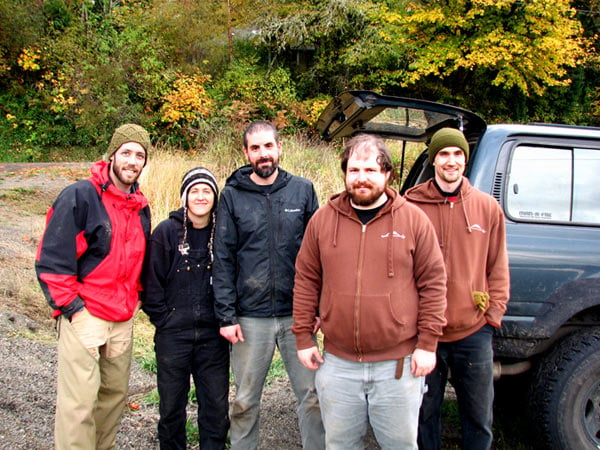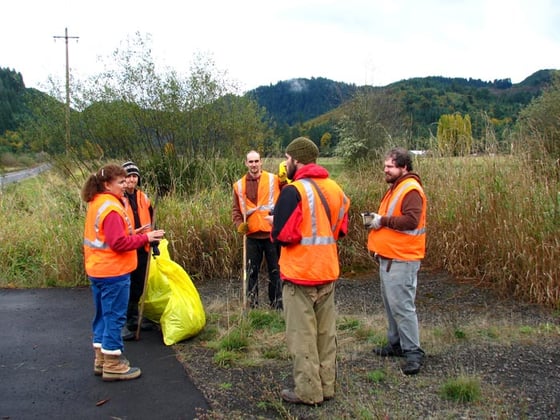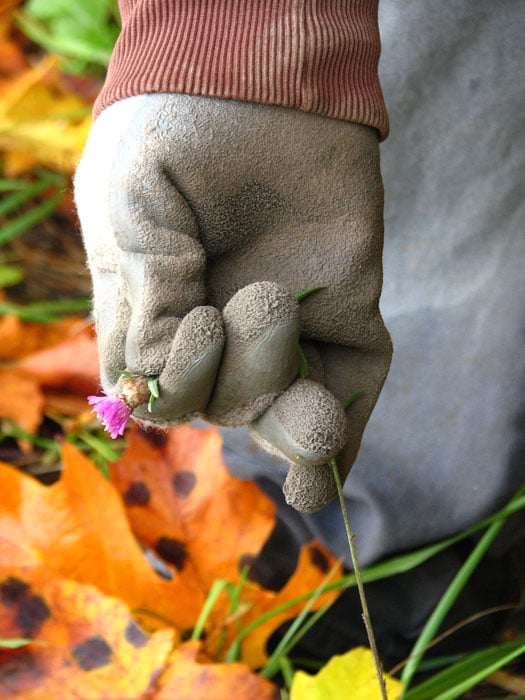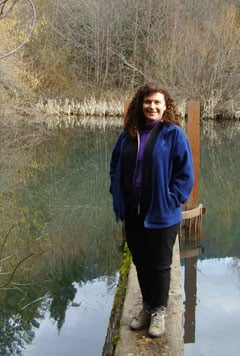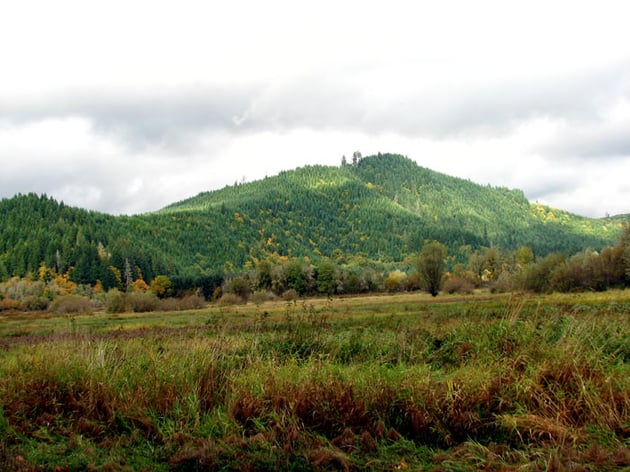This post comes to us from Josh, our Administrative Assistant! He’s the second fellow from the right in the group photo above. Josh has worked in shipping and administration at Mountain Rose Herbs since 2010. He and the crew participated in another one of our community service adventures through the Mountain Rose River Project and he returned with an interview from Lisa Arkin of Beyond Toxics to share…
Last Wednesday, volunteers from Mountain Rose Herbs teamed up with Beyond Toxics to help remove invasive weeds around our waterways near Triangle Lake in Oregon. For years, knapweed and scotch broom have blanketed the countryside, spreading and propagating while muscling out the healthy, native plant life.
To combat this issue, the state has traditionally employed trucks that indiscriminately spray gallons of herbicides down the side of the road, endangering native plants, animals, and humans as well. This excessive mist of toxic chemicals seeps into the waterways, damaging the local ecosystem and threatening the salmon populations.
Invasive plants such as knapweed and scotch broom are a nuisance and a threat, but we do not need to accept toxic chemicals as the answer to the problem. Beyond Toxics has provided a clean, environmentally friendly method for removing these plants from local communities by pulling, dead-heading, and killing the weeds through shade tarping.
Our dedicated group of volunteers had the amazing opportunity to join Beyond Toxics in one of its seasonal weed pulling projects. Strapping on boots and raingear, packed with water and lunches, we arrived early in the day, shortly after the sun had settled in the sky. While it was a pleasure to get out and help the local community, it’s impossible to claim that our motives were completely selfless. We relished the opportunity to get out and smell the crisp autumn air and feel the simultaneous kiss of the sun and breeze. Against our expectations, the sky remained clear with just a whisper of cloud cover floating through the sky.
After meeting with some local volunteers we focused mostly on knapweed, plucking off the seed heads and pulling out the roots wherever we could. Previous volunteers had placed tarps over the especially problematic areas. Here, we pulled up the tarps and spread native grass seed in order to discourage the knapweed from returning.
Our journey took us to several spots down the road where we continued our effort to beautify the environment without resorting to nasty chemicals. Though the process was rewarding, it was also humbling as we came to realize how much work there is to be done. Organizations like Beyond Toxics help to manage these sometimes daunting responsibilities by seeking out volunteers and taking stewardship over the land that we all need in order to live and thrive.
Interview with Beyond Toxics
In order to gain a better understanding of Beyond Toxics and how their work benefits all of us, I sent some questions to Executive Director Lisa Arkin. She was kind enough to share her amazing insight. Working with Beyond Toxics was a pleasure, and I encourage everyone to find a cause they can invest in within their own community.
How are invasive species like knapweed and scotch broom harmful to our communities and waterways?
These plants propagate very quickly, and because they are so hardy, they tend to out compete native plants. They “blanket” ecosystems and crowd out everything else. Also, Scotch Broom tends to be flammable, so not good for wild fires.
How does an organization like Beyond Toxics choose which projects to undertake? Specifically, what drew you to working on the Triangle Lake area?
We are a membership organization, and so we often take requests from our members. In this case, the Triangle Lake Area has been hard hit by aerial forestry pesticide sprays. The people there are sick, and sick and tired. Many felt they could not safely travel the roads because of the additional highway sprays. Also they believe (and we agree) that the highway sprays are excessive and unnecessary. This area is also a salmon habitat area, important for the survival of Coho salmon and trout. It is important for residents to want the project enough to volunteer, and we have had good volunteerism for many of our projects out there. In fact, some residents will be going out on Thursday to finish up what our team could not get to last week.
What can members of the community do in order to educate themselves and contribute to the solution?
Read our website, because we post lots of articles and information! Join our Facebook page to get involved and updated. Join Beyond Toxics as a volunteer! There isn't going to be much about these topics in mainstream media, and that is why getting involved with an environmental non-profit is so important. We care and we take action!
What kind of positive changes have you observed in the community after a successful removal project?
Pride. Belief in a better world. Empowerment.
What more needs to be done at Triangle Lake to ensure clean waterways and a permanent eradication of harmful invasives like knapweed and scotch broom?
We need to change the policies of the State of Oregon regarding pesticide treatments for invasives, how roadside maintenance is performed, and designate more funding to hiring people (who need the work by the way!) to get out there and remove plants manually.
Are there any future projects that you’d like to discuss with the Mountain Rose Herbs community?
Oh yes! We really need to partner with Mountain Rose Herbs fans on our statewide pesticide reform bill – we have written new law for reducing pesticides on public property all over the state – and we need your help to get in passed in 2013. I believe we can succeed! See http://www.beyondtoxics.org/work/safe-public-places/ for more information!

